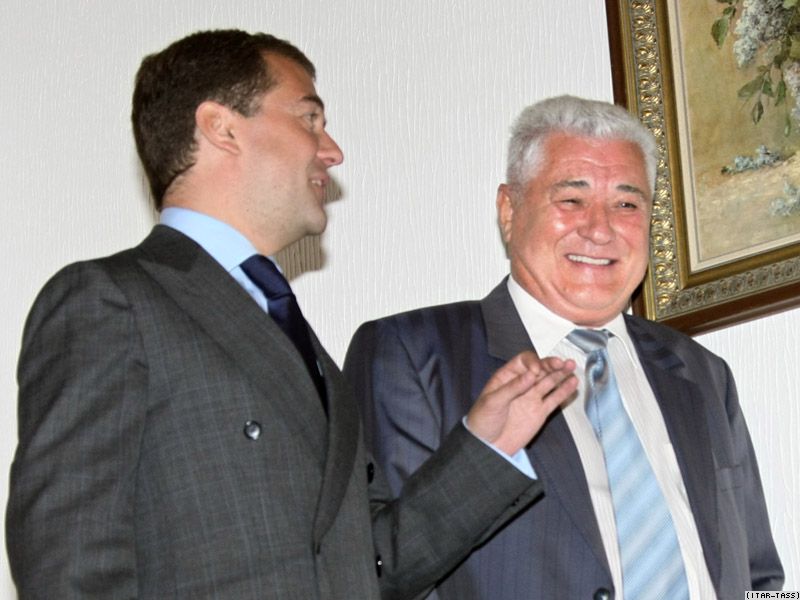
Voronin-Medvedev Accord Demolishes Moldova’s Negotiating Position on Transnistria
Publication: Eurasia Daily Monitor Volume: 6 Issue: 54
By:

Apparently panicking in the run-up to the April 5 elections, Moldovan President Vladimir Voronin has hoisted the white flag of surrender on Transnistria in return for a pre-election endorsement from the Kremlin. The president can not run for a third term of office but his Communist Party hopes to profit from the Kremlin’s televised accolades to Voronin.
On March 18 Russian President Dmitry Medvedev hosted Voronin and Transnistria’s Russian-installed "president" Igor Smirnov at the Barvikha residence near Moscow. The three signed a Russian-drafted joint declaration, the key point of which stipulates: "Noting the stabilizing role of the existing peacekeeping operation, the sides consider that it would be advisable to transform it into a peace-guaranteeing operation under the aegis of the OSCE upon [attaining] the outcome of a settlement in Transnistria" (point 4). The English translation loses some of the nuances of the Russian original: "Storony … iskhodyat iz tselesoobraznosti yeyo [operation’s] transformatsii v mirogarantiinuyu operatsiyu pod egidoy OBSE po itogam pridnestrovskogo uregulirovaniya."
Meanwhile, "the sides" would continue negotiations through direct contacts (point 2) with the professed intention to reactivate the international "5+2" negotiating format, to be reconvened "if possible" during the first half of 2009 (point 3) (Russian Ministry of Foreign Affairs website, Interfax, March 18, 19).
The declaration does not contain any reference to Moldova’s sovereignty and territorial integrity, nor to a special status for Transnistria as a part (nominally at least) of Moldova. The Russian side does include lip service to that effect in bilateral statements with Moldova and in Russia’s own diplomatic statements. The Russian drafters, however, did not include such references in the trilateral declaration, ostensibly because as a "mediator," Moscow had to take Tiraspol’s position into account.
Smirnov was the only one to appear before the media in Moscow after the trilateral meeting. He named two major changes that this declaration introduces to the negotiating process. It can ensure the Russian troops’ continuing presence in Transnistria for the duration of the negotiations toward a political settlement, and it opens the way for Russia to advance from a peacekeeper’s role to that of a post-settlement guarantor (Interfax, March 18, 19).
Voronin’s signature on the document practically demolishes Moldova’s carefully constructed, Western-backed negotiating position, known as "the Package," on the table since the autumn of 2006. Voronin’s negotiating team—top presidential adviser Marc Tcaciuc and Reintegration Minister Vasile Sova—has tried hard all along to persuade Moscow to accept the Package. That team did not accompany Voronin to Moscow. It was in the dark about the preparations for this visit and must be aghast at the results. Nor does the Ministry of Foreign Affairs seem to have been involved in this event. The president ventured unprofessionally into a trap.
The consequences are not irreparable, but they will haunt Moldova and its next president and government, and will derail any bona fide negotiations on resolving the Transnistria conflict for some time to come.
The crucial point 4 implies that Moldova would drop, or suspend, its demand for withdrawal of Russian troops and transformation of the existing "peacekeeping" operation into an international operation of a civilian character. By the same token, it implies renouncing the 1999 OSCE Istanbul documents on Russia’s obligation to withdraw the troops fully and without conditions. By consenting now in Moscow to postponing the troop withdrawal until a political settlement has been attained, Voronin actually gives Russia an incentive for stonewalling on the political settlement or imposing extortionate terms.
Moldova’s Western partners have been trying to negotiate a withdrawal of Russian troops in the context of the political settlement negotiations or within those negotiations. Point 4 in this document, however, undermines that position, which Chisinau had itself developed together with the European Union and the United States.
Under the same point 4, moreover, Russian troops may even stay in Moldova after a political settlement, ostensibly to "guarantee" it. Although this would involve an OSCE flag, Russia has a long record of misusing, manipulating, and blackmailing the OSCE in Moldova and in Georgia.
There is a silver lining here, however. The language in point 4 is far from binding even politically (let alone legally). It does not create any obligation or commitment for Moldova to accept the Russian troops but merely an assumption ("iskhodyat iz tselesoobraznosti") that this idea would receive favorable consideration. The key word "tselesoobrazno" implies no more than useful, advisable, desirable, appropriate, and expedient.
Chisinau is unambiguously defeated in point 2, which establishes an equivalent status for Moldova and the unrecognized Transnistria in negotiating under Russian arbitration. The choreography of the Moscow meeting was similarly designed to equate Tiraspol with Chisinau.
Point 3 is seen by some observers as a mitigating factor, because it envisages reconvening "5+2" negotiations (Russia, Ukraine, OSCE, United States, European Union, Chisinau, Tiraspol), which are on hold since Moscow and Tiraspol torpedoed them in February 2006. Reconvening those negotiations, however, is subject to the qualifier "if possible." Moscow and Tiraspol would like to cajole Chisinau into a separate solution, to be then presented as a fait accompli to the Western participants in the international format.
Tiraspol had all along refused to sign any document that would contain a reference to Moldova’s territorial integrity. Russia has every means at its disposal to change Tiraspol’s position if it chooses to do so. This is a fact that induces Voronin periodically to lurch, sometimes frantically, for Moscow’s support. He has again returned to Chisinau empty-handed or worse, with a document he could not have lived with only a short time ago.
On process as well as substance, Voronin’s escapade defeats Chisinau’s own "Package." Its logic since autumn 2006 has been to circumvent Tiraspol and give Moscow an incentive (without any major concessions) to accept a settlement consistent with Moldova’s state interests. At the Moscow meeting, however, Russia has reintroduced Tiraspol vigorously into the equation, turning the bilateral Chisinau-Moscow process into a trilateral process, now with Tiraspol in a blocking role not just de facto but officially.
Voronin himself decided at the last moment to go to Moscow for his pre-election photo-opportunity with Medvedev, but he had not intended to sign a document. At Barvikha, however, he was suddenly confronted with the Russian draft and caved in, essentially buying the Kremlin’s electoral endorsement at this price.
Televised images of Medvedev praising Voronin for developing Moldova-Russia relations should significantly benefit Voronin’s Communist Party in the April 5 elections. Voronin also held a well-advertised meeting in Moscow with the Orthodox Patriarch Kirill.
It is a measure of Moldova’s political underdevelopment that Medvedev and Russian Prime Minister Vladimir Putin hold the first two places in Moldova’s political ratings (ahead of Voronin, who holds a distant first place among local personalities) and that Moldova’s Orthodox Church, affiliated with the Russian Orthodox Church’s Moscow Patriarchate, enjoys the highest confidence rating among Moldova’s institutions. The vote-dependent politician Voronin has apparently decided to exploit this situation recklessly ahead of the elections; and he gave in to Moscow more than he thought he had bargained for.




